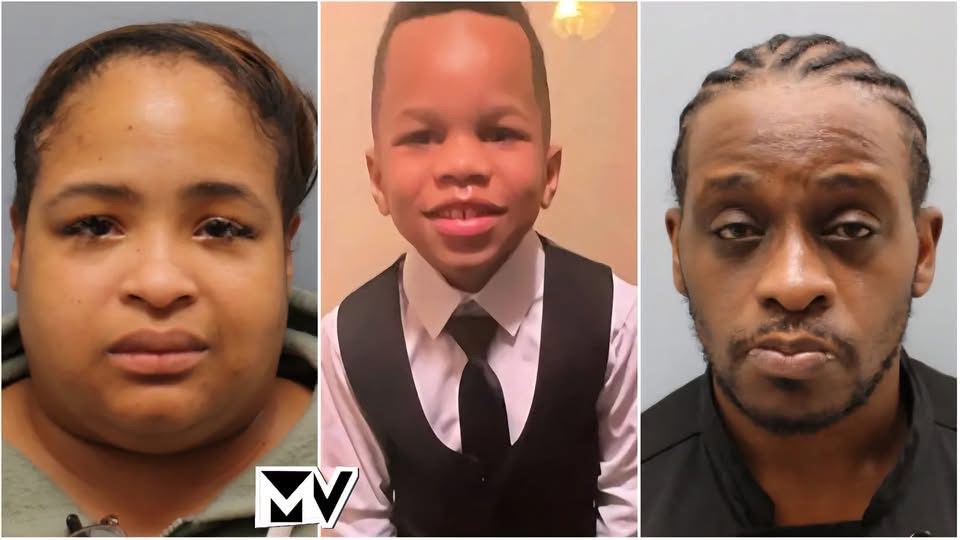HARRIS COUNTY, TX — A painful chapter in Harris County has come to a close as the community grapples with both the horror of a child’s death and the measure of justice finally delivered. On Wednesday morning, 45-year-old Jermaine Thomas was sentenced to 50 years in prison for the gruesome murder of his 7-year-old adopted son, Troy Khoeler. The sentencing brings legal resolution to a case that shocked and devastated the region when it first emerged in July 2022.
The tragedy began to unfold when, on July 28, 2022, authorities responded to a report of a missing child at a home in the 4400 block of Rosegate Drive in north Harris County. The initial call came from Thomas himself, who claimed the child was nowhere to be found. But what law enforcement discovered hours later would unearth a nightmare no one had imagined — little Troy’s lifeless body stuffed inside a top-loading washing machine in the garage of the family’s home.
Investigators quickly determined that Troy’s injuries were not consistent with an accidental death. Instead, they pointed toward severe abuse, and evidence began to mount that the very individuals responsible for caring for Troy had inflicted unimaginable harm. The autopsy later revealed the boy suffered from blunt force trauma, bruising, and signs of prolonged abuse. The washing machine had been used not only as a hiding place but as a grotesque symbol of the cruelty endured by a defenseless child.
Following a lengthy investigation, Jermaine Thomas was arrested and charged with capital murder. His wife and Troy’s adoptive mother, Tiffany Thomas, was also questioned, though her legal standing in the case has remained separate. Authorities revealed disturbing text messages between the couple in the days leading up to the child’s death — messages that painted a picture of resentment, frustration, and a deeply troubled household. In one of the most chilling messages presented in court, Thomas reportedly threatened to “put [Troy] in the washer,” a statement that prosecutors said ultimately became a sickening reality.
The courtroom was filled with heavy silence as prosecutors recounted the events leading up to Troy’s death. Photographs, forensic reports, and emotional testimonies painted a haunting portrait of a child who was failed at every turn. Described by teachers and neighbors as a sweet, quiet boy with a gentle spirit, Troy had been adopted from the foster care system — a system that was supposed to provide him with safety and love.
During sentencing, the prosecution called the crime not only brutal but methodical, noting the lack of remorse exhibited by Thomas. “This was not a moment of rage,” one prosecutor stated. “This was a pattern of abuse and a culmination of cruelty that ended in a child’s senseless, horrifying death.”
The defense tried to argue that Thomas was a man overwhelmed by stress and emotional instability, but that argument held little weight against the sheer brutality of the crime. Ultimately, the jury sided with the prosecution, delivering a sentence of 50 years in prison — a term that reflects both the severity of the crime and the enduring scar left on the community.
Outside the courthouse, members of the community gathered to mourn the life lost and express support for Troy’s remaining biological family. Candles, stuffed animals, and notes still sit outside the house where the unimaginable took place — a somber reminder of a young life taken too soon.
This case has reignited conversations about child welfare, the scrutiny of adoptive parents, and the responsibilities of those charged with protecting vulnerable children. Troy Khoeler’s story is one of profound tragedy, but the sentencing of Jermaine Thomas marks a step toward justice. Though it will never bring Troy back, it stands as a solemn reminder that the most innocent among us must be protected with vigilance, compassion, and unwavering accountability.
As the Harris County community moves forward, Troy’s memory will not fade. His story has left an indelible mark, and his name will continue to be spoken — not as a victim alone, but as a symbol of the desperate need for change.

Leave a Reply